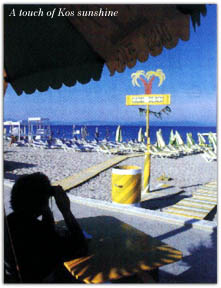
|
Greece has been in the tourism business for a very long time. If you want to stretch a point, you can trace it right back to classical mythology when Zeus, father of the gods, counted among his many responsibilities the welcomin
g of visitors. Offering hospitality to a foreigner was considered a divine obligation. Be that as it may, a healthy tradition of xenophilia has been nurtured over the years. Today's Greeks genuinely do seem to like foreign tourists, even if those same tou
rists often can't stand the sight of one another and go to great lengths to escape from the madding crowd. |
|
Seductive mix The potent lure of ancient civilization, warm climate, good food, beautiful landscape and poetic associations put Greece in pole position when tourism first became a serious economic activity. Greece's promotional posters date back as early as 1928, and t he National Tourist Organization of Greece has been active in London since 1957. When the travel boom of the 1960s launched the modern tourism industry, Greece - along with Spain and Italy - was a prime beneficiary of the huge flow of sun-seeking visitors heading from north to south.
According to official estimates, tourism today accounts for some 7.5 per cent of Greece's GNP, 16 per cent of all Greek exports and is reckoned to employ five percent of the total work force. But national statistics are misleading. It is actually much mor e important than that. In many Greek islands, tourism is essentially the lifeblood of the local economy, and many small places have found in it the only way of surviving. Visitors have this contributed something quite substantial to stem the otherwise uns toppable rural exodus to Athens and Thessaloniki. Exotic destinations In spite of all this, Greek tourism now finds itself facing a dilemma. Recession in Europe, the hard drachma policy and increasing competition from other exotic destinations have all played their part, but there is also an underlying awareness that Greece needs to redefine her place on the world tourism map. The image created back in the 1960s, both for island-hopping backpackers and package tourists, was of a cheap place in the sun where the living was easy. Now that very cheapness is being perceived as a negative, in that it encourages ever more lower-spending tourists which in turn discourage the higher spenders. Accordingly, Greece is determined to go upmarket by upgrading services and facilities. Seasonal business Prompted by the Minister of Development Ms. Vasso Papandreou, the National Tourist Organization of Greece (EOT) is seeking greater involvement of the private sector. EOT's huge portfolio of state-owned tourist properties, ranging from hotels to beaches, i s steadily being sold off to commercial interests. But the marked seasonality of tourism in Greece poses a formidable challenge, with 92 per cent of annual arrivals concentrated on just over half the year, from April to October. Many Greek islanders are u nderstandably quite content with an economic cycle which winds down in the autumn and doesn't pick up again until spring. But it doesn't look so great to accountants poring over the balance sheets.
The most promising markets in terms of growth percentage are in the territories of the former Soviet bloc. Russia finds itself intimately drawn to Greece, the only western country with which it shares the religious traditions of the Orthodox Church and to which it owes its Cyrillic alphabet. By contrast to their previous image in the old days of socialism, these new eastern European tourists are not by nature low spenders. The Russians, in particular, are never happier than when splashing out stacks of mo ney on holiday fun. Meanwhile, early indications for 1997 were more promising than had been feared by the doom-mongers. But a considerable shock has been registered nonetheless and earnest discussions will continue throughout the long hot summer about the way ahead for Greek tourism. We can probably look forward to a more intensive promotion of the essential Greekness of Greece and her unique cultural inheritance. Perhaps we might also expect a thunderbolt from Zeus who has been mightily displeased by the falling visitor lev els in recent years. In truth, larger consignments of foreign tourists are urgently needed to placate the father of the gods. 
|
The Greek economy is having a shaky time, but one business that is constant is the oldest of all.
Michael Jenner reports.

